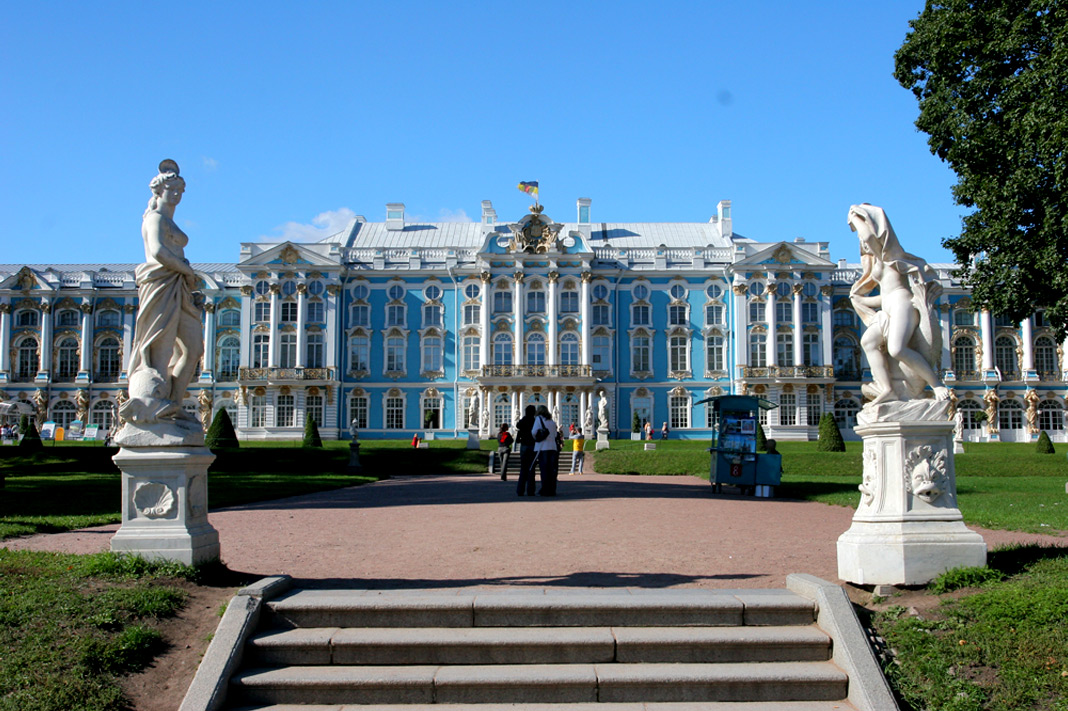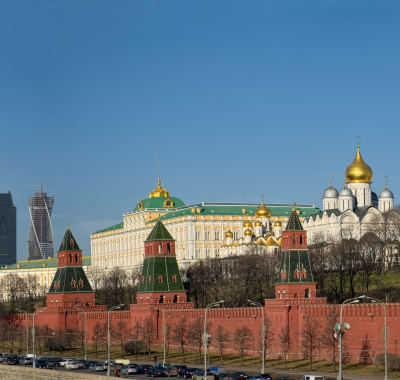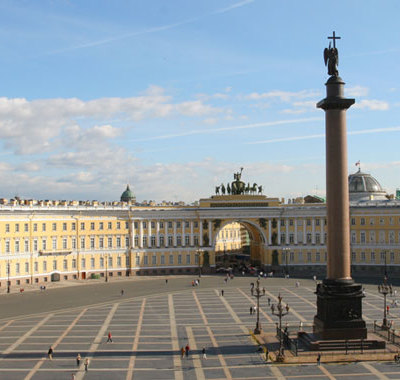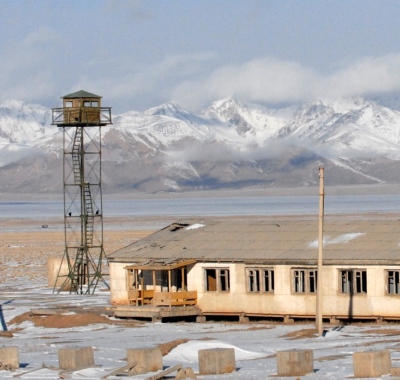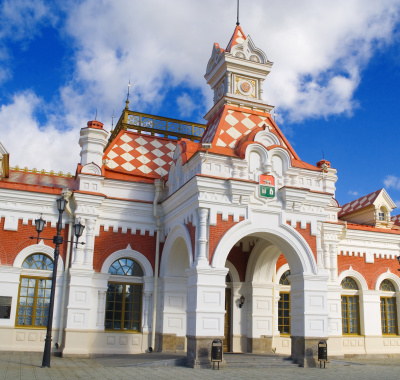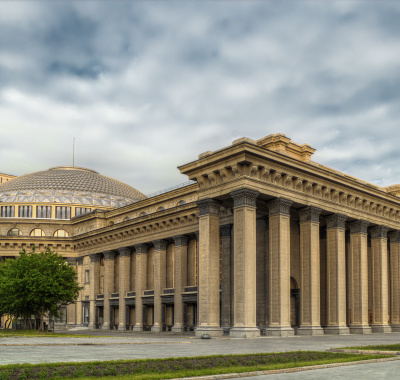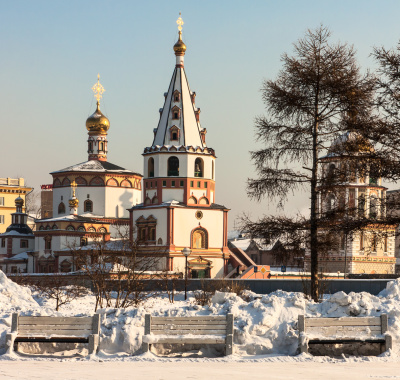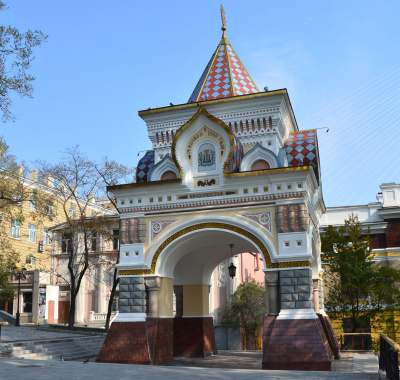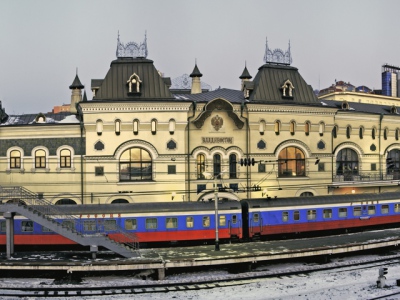Destination Russia
Even after the implosion of the USSR, Russia remains the largest country in the world – covering more square kilometers than any other. But the statistics are deceptive – huge tracts of the Russian North are forest or icy tundra, inhabited only by wolves, bears, elk & deer… and the few trappers who hunt them. Despite its enormous size, Russia’s population is only 2.5 times that of the British Isles. Even today, the majority of Russians live in small towns and villages – very often more than a day’s journey from the nearest large city, airport, or rail connection. Russia’s severe climate makes it unfeasible or impossible to provide road or rail connections to much of the North of the country, where winter low temperatures can regularly drop to –55ºC or even lower. Remote communities living in the North receive winter supplies and mail by helicopter drops when visibility conditions permit.
But the picture of never-ending winter in Russia is wrong too – even the Arctic coast enjoys a bright, warm summer, in the Land Of The Midnight Sun. Long before Christianity reached Russia, the northern tribes saw their calendar as an ongoing battle between two complementary gods – Svarog, the sun-god, and Chiornobog, the god of darkness. This becomes very believable if you visit a Russian northern city like Murmansk – where there is only 22 minutes of daylight in mid-winter, or half an hour of darkness in midsummer.
Learn More...
Early history of Russia
Contemporary Russia covers many areas – especially to the South, East & North – which were not originally Russian, and are home to many peoples who aren’t ethnically Russian, although they are Russian citizens. The expansion to the East (and North, although the North has never been truly “colonized”) began after 1480. Prior to the Mongolian attacks of 1240 AD, Russia had been a purely European state, around the size of present-day Germany – it was regarded as the “last Christian country” in Europe on the journey East, and enjoyed friendly and favourable relations with the rest of Europe. Russia had been part of a loose alliance of “Viking” nations that included most of Northern Europe and even Iceland – its position at the “sea gateway” to the Orient made its merchants rich by trade in both directions. Allies abroad sought to cement their relations with the Russian Grand-Princes (as Russia’s rulers of the period titled themselves) by political marriages. England’s Harold II (Harold Godwinson – who famously lost the Battle of Hastings later) sent his daughter Gytha to marry the Russian ruler, Vladimir Monomakh. Gytha converted her new husband to her faith of Christianity, and in turn Vladimir imposed his faith on his countrymen. The interchange of political brides went in both directions – if you visit Edinburgh Castle’s highest point you find the Chapel of Princess Margarita of Kiev…allegedly she dropped dead of grief when she heard her husband, the King of Scotland, had died in battle against the English. But the splendour and glory of medieval Russia was cut short in 1240, when the country was invaded and briefly occupied by the Mongolian Horde of Genghis Khan. Genghis didn’t choose to occupy his new territory however – instead he turned control of Russia over to his fellow Siberian Asians, the Tartars, to collect his taxes and remit them to him in Mongolia. It would take Russia until 1480 to overthrow them.Russian history under the Tsars
It took a crisis in Mongolia to change the situation – a battle for power broke out between rival factions of the Mongolian royalty. Russia took the opportunity to attack the Tartar overlords and regained control of their own country once more. But to “secure their position” the Russian armies went much farther East, pursuing the Tartars to their home city of Kazan and utterly destroying it. (A glance at the map shows where the extent of Russian control lay eastwards at this time). However, it didn’t stop there – a renegade band of Russians under the command of the infamous pirate Yermak Timofeyovich blasted eastwards into Siberia, grabbing the territory of the native Asiatic peoples they came across. (In fact many of these Asiatic peoples still live in Siberia, although their story has been mostly ignored by both Tsars and Soviets alike). Russia’s fortunes had come full-circle – from being subjugated vassals of the Mongolians to ruling a substantial and wealthy empire. Russia had also taken-in the many thousands of Greek monks and other Christian communities who had fled the Fall of Constantinople in 1453. The advisors to the Russian rulers suggested that Russia had a right to consider itself the “Third Rome” (since the now-wrecked Constantinople had been the “second”) – since Russia was now the dominant Orthodox country in Europe. From this point the Russian Grand-Princes changed their title.. believing themselves to be “Caesars”, or “Csars” as this was pronounced in Russian (the “c” was pronounced “ts” – conventionally we now write this as “Tsar”, but really neither is “right” since Russian has a special letter that has no English equivalent). These new centuries of Russian self-confidence saw Moscow rebuilt, and a new capital built on the Baltic – St Petersburg (1703).Imperial Russia
Even the title “Caesar” was no longer enough for the Russian monarchs, newly-installed in Europe’s first purpose-built capital city – they now fancied themselves as Emperors, and titled themselves accordingly. Of course, an Emperor needs – an Empire, so they set out to acquire one. Step one was to consolidate the “drive Eastwards” and establish Russian rule over the Asiatic peoples of Siberia – not only as far as Vladivostok, but even staking claims to Kamchatka, the Sakhalin Islands, the Kuril Islands, and Alaska (sold to the USA for $7.2m in 1867, because of the unfeasible cost of defending it). Under Catherine II a major push began southwards, seizing territory from the Turks and consolidating Russian power in Central Asia. The drive continued in the C19th but using different tactics – offering bribes and financial “considerations”, and slowly picking-off the tiny Caucasus countries and principalities one by one… their rulers became Russian Princes with nice mansions in St Petersburg, ceding effective power to the Russian Emperor. It was this continued expansion of Imperial power – and disagreement with Germany about regions Russia hoped to control – that led Russia into WW1 against the German Kaiser. After a century of conducting their empire-building by diplomacy and bribery, the Russian army hadn’t seen service since Napoleon, nor had it changed its tactics. The Germans, however, had tanks, long-range cannons and mustard gas – the Russians died in thousands.Russia in WW1 – mutiny & revolution
Although the official “Party” view on the reasons behind the Russian Revolution ascribes it to the realisation of Marxism in practice, a more realistic view would probably place the causation as a combination of the catastrophic military strategy of Nicholas II and his generals, allied with and resulting in chaos and disaster on the home front simultaneously. What effectively happened is that the troops in the trenches mutinied against their brutal and sadistic officers, and this mutiny turned into a more wide-spread revolt against Tsarist authority. Waiting to sieze on this moment, however, were professional revolutionaries who encouraged it and orchestrated it. There is a further suggestion – hotly denied by the USSR and never proven in solid fact – that Lenin had signed an agreement with the Germans, along the lines of “if you start a Revolution which takes Russia out of the war, then we will fund it”. It’s a known fact that Lenin was in Berlin (ie the enemy capital) immediately prior to his return to Russia, and that he returned in a privately chartered armoured train provided for him by the government of the German Kaiser. What is disputed is whether the reason for it being an armoured train is that it was – as rumour suggests – stacked with gold bullion to fund the Russian Revolution. There were, of course, two Russian Revolutions – but the Communist Party attempted to wipe-out all reference to the first. In February 1917 the Tsar abdicated, and handed control of the country to a Provisional Government, headed by Kerensky. For Lenin and his followers this was a start-the-revolution-without-me disaster – the Revolution had happened without them, and they’d got nothing. By a bizarre twist of fate, Lenin’s cause was saved by his arch-enemies, the ultra-Tsarist officer corps who wanted to restore the Tsar to the throne. The officers mounted military attacks on St Petersburg in support of their demands. Trotsky – the most senior revolutionary on the spot, since Lenin was still in hiding abroad – utilized the situation to undermine public confidence in the Provisional Govt, saying that this was all Kerensky’s fault. It was Trotsky’s administrational and military abilities that organized an armed uprising – a mixture of professional revolutionaries, naval seamen and factory workers – on November 7th 1917. They stormed the Winter Palace – but we must remember that the Royal Family no longer lived there, and it was now the offices of the Provisional Govt, Kerensky and his ministers were arrested – but instead of reprisals, Trostsky saw the value in releasing them unharmed if they agreed to go into foreign exile. At this point Lenin finally arrived, and a Communist Government was declared.Russia under Communism
If nothing else, Lenin’s arrival brought one benefit to Russia – a peace treaty with Germany and the return of the Russian troops from the Front. The Revolution was initially welcomed by the intellectual classes – the final thirty years of Tsarist Govt had been a police-state (following the assassination of Alexander II in 1882) marked by heavy censorship, restrictions on contacts abroad (Alexander’s murder had been – falsely – blamed on “foreign anarchists”) or even foreign books. A brave new era was under way – but it didn’t last long. As former victims, the Communists new how efficient the Secret Police was in Russia, and now wanted it working for them… and there were old scores to be settled. The first was with the Royal Family – who were taken to house arrest in Ekaterinburg, and then shot, including Anastasia. The execution of Leon Gumilev – famous poet and decorated war-hero, who was arrested at night and shot the next morning – sent a shiver through society. But these were merely a trickle compared to what happened when Stalin grabbed power on Lenin’s death (despite Lenin’s deathbed note imploring the Party never to permit Stalin to assume command). Stalin’s rule of the USSR was notoriously brutal, and despite his retrospective attempt to cast himself as a “great war leader”, in fact it was his blunder in believing that Hitler would not invade the USSR which caused the bulk of the soviet WW2 casualties – which topped 20M dead. Stalin survived the war, to be replaced by a brief thaw under Kruschev in the 1950s. But the Party weren’t ready for Kruschev’s reforms, and he was quickly oustered by Leonid Brezhnev.. who ushered in a period of economic stagnancy and hopeless underachievement that ran through until the mid-1980s, when Communism fell into a terminal crisis.Perestroika and beyond
Under Mikhail Gorbachev – formerly a soviet-era agriculture minister – there was, at least, a recognition that soviet economic achievements were a sad and unfunny joke… the Cold War had been lost, due to funneling funds into military projects whilst failing to provide for the country’s people. “Rebuilding” (perestroika) was announced, and a policy of “openness” (glasnost’) was supposed to make it happen. Although a few banned books were unbanned, very little happened in practice – and you cannot eat banned books. A limited exercise in small-scale trade with the West began, with the terms usually set-up to benefit someone in the government privately, rather than the end-users. Finally the military hardliners grew weary of this bungling and kidnapped Gorbachev in the famous “coup” – during which Moscow Mayor Boris Yeltsin saw the main chance and assumed control of the resistance. Within a few days the coup was over, the plotters arrested, and Gorbachev released – but jobless, as Yelstin had abolished the Communist Party as an illegal organization. Gorbachev was a leader with nothing to lead. The USSR quickly imploded and its constituent members split away – elections put Yeltsin in charge of a freshly-separated Russia. However, the massive stakes involved with privatising Russia’s economy proved too tempting for the burocrats involved in the process – staggering levels of corruption and fraud were seen. But Russians knew corruption of old, and it wasn’t this that made them learn to despise Yeltsin… it was his behaviour that shamed the country abroad, his drunkenness on state occasions, and his frequent stupid remarks which cut the legs from under him. A smartly-turned-out official, in a suit, with impeccable manners and speech, would walk away with the leadership after Yeltsin – so they searched for someone who fitted the bill, and his name was Vladimir Putin. The Putin years have been notable for the revival of national pride in very carefully-planned (some might say overtly propagandistic) ways, but whatever the methodology, the revival of the Russian economy has been dramatic. With the helm now passed to Dmitry Medvedev, it remains unclear how great is Vladimir Putin’s role in running the country as its Prime Minister… and who holds the reins.
Russia Facts
National Capital:
Moscow
Area:
17 million sq km (the largest country in the world by area)
Population:
142m (the 9th-largest country by population)
Government:
Presidential Democracy.
Major language:
Russian (+ 50 languages of indigenous peoples are spoken/written)
Major religions:
Christianity, Islam
Life expectancy:
59 years (men), 73 years (women) (United Nations statistics)
Currency:
1 rouble = 100 kopeks
Travellers Checklist
Hints, Tips & Fun Facts...
Don’t take a suitcase. Take a soft bag with wheels and a pulling handle.
Your payment is protected: everything is held in a trust account until you've completed your trip.
Explore the blog
- Celebrations and Events
- ►Destinations
- ►Life
- News
- Russian Language
- ►Series
- (Moderately) Superstitious
- A and L in Irkutsk
- A Few Choice Words
- Alien Visitors
- All About The Bottom Line
- All In The Game
- All In The Preparation
- All Quiet on the Eastern Front
- Almost Medieval
- Ancient Traces Revisited
- Animated Russia
- Anomalous Zones
- Arrival: Beijing
- Baba Yaga Revisited
- Backwards and Forwards
- Baikal at Last!
- Business in the City of Extremes
- By the time you read this
- Captured Fragments
- Chasing the spirit
- Cheaper – Better – Easier
- Christmas Leftovers
- Doomed Utopias
- Dreams Made Concrete
- Easter Variations
- Eastwards To Novosibirsk
- Feline Exhibits
- Fragmentary Views
- Free Knowledge for the Proletariat
- Free Russian Cinema
- Gobi and Steppe Wanderings
- Good Advices
- Good Traditions
- Grandfather Frost
- Here Seeking Knowledge
- Hiking – Cooking – Tick Picking
- How Cold?
- How Hot?
- Igor the Shaman
- In and Out of Ulaanbaatar
- In and Out of Ulan Uday
- International Womens Day in Russia
- Irkutsk Now
- Is It Safe?
- Joanna Lumley’s Trans-Siberian Adventure
- Kizhi: Scattered Memories
- Kvas – The Good Stuff
- Language and literature 2016
- Last stop: Vladivostok
- Life On Rails
- Loveless
- Low Season Traveler
- March Of The Immortals
- Maslenitsa
- Matilda: A Russian Scandal
- Minefields of the soul #1
- Mongolia By Proxy
- More on Krasnoyarsk
- Mythological?
- Nightmare Fuel
- Non-Verbal Confusion
- Opposing Worlds
- Over The Border
- Pagans On Ice
- Pronunciations and Tribulations
- Random Freezings
- Remembrance Day
- Russia Sells Alaska
- Russian Language: Ways and Means
- Russian things to see and do
- Scam-Tastic
- Scrapbooks and Backpacks
- Sculpting the National Character
- See You In The Bunker
- Shadow Man in Circumspect
- Shot By Both Sides
- Siege Fatigue
- Something about Cossacks
- Sort Your Life Out
- Stretching the Ruble
- Survivalist
- Sweeping generalisations
- Systems of Control
- Taking Care
- The Bear Thing -and Other Interlopers
- The Ghost at Your Shoulder
- The Other 10%
- The roll of the egg
- The Silent Anniversary
- The Snow Maiden
- The Spirits of Winter
- The Temple at the Border
- There’s a Russian in my House
- These Four Walls
- Thespian Pursuits
- This Word “Defective”
- Trans-Siberian Offshoots
- Trips and Tales
- Unknown Territories
- Unseen Unheard
- Visitations
- Vodka
- Voices of Experience
- Welcome to Magnitogorsk
- When a lobster whistles on top of a mountain
- Words are Hard
- X-rays and space ships
- Yes They Mean Us
- Your Cash In St.Petersburg Now!
- Zaryadye Park
- Tourist Tips
- Uncategorized





